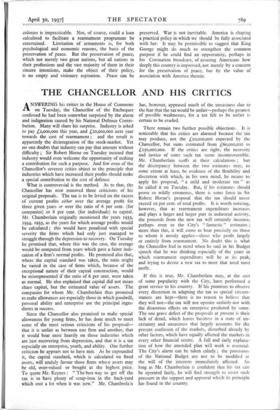THE CHANCELLOR AND HIS CRITICS What is controversial is the
method. As to that, the Chancellor has now removed three criticisms of his origin-al proposals. The tax is to be levied on the excess of current profits either over the average profit for three given years or over the ratio of 6 per cent. (for companiei) or 8 per cent. (for individuals) to capital. Mr. Chamberlain originally mentioned the years 1933, 1934, 1935, as the yeart for which -average•profits would be calculated ; this would have penalised with special severity the firms which had only just managed to struggle through the depression to recovery. On Tuesday he promised that, where this was the case, the average would be computed from years which gave a fairer indi- cation of a firm's normal profits. He promised also that, where the capital standard was taken, the ratio might be varied in the case of firms which, because of the exceptional nature of their capital construction, would be misrepresented if the ratio of 6 per cent. were taken as normal. He also explained that capital did not mean share 'capital, but the estimated value of assets. The companies for whom Mr. Chamberlain thus promised to make allowances are especially those in which goodwill, personal ability and enterprise are the principal ingre- dients in success.
Since the Chancellor also promised to make special allowances for young firms, he has done much to meet some of the most serious criticisms of his proposal- -that it is unfair- as between one firm and another, that it would bear most heavily on those industries which are just recovering from depression, and that it is a tax especially on enterprise, youth, and ability. One further criticism he appears not to have met. As he expounded it, the capital standard, which is calculated on fixed assets, will unduly favour those firms whose assets may be old, over-valued or bought at the highest price. To gnaw 'Mi. Keynes : " The best way to get off the tax is' to have plenty of scrap-iron in the back-yard Which cost a lot when it was -new." Mr. Chambetlain has, however, appeased much of the uneasiness due to the fear that the tax would be unfair—perhaps the greatest of possible weaknesses, for a tax felt to be unfair is certain to be evaded.
There remain two further possible objections. It is noticeable that his critics are alarmed because the tax may produce, not the £20,000,000 expected by the Chancellor, but sums estimated from £6o,00o,00o to £25o,0oo,000. If the critics are right, the necessity and justice of some such tax seem incontrovertible. Mr. Chamberlain scoffs at their calculations ; but the discrepancy between the two estimates may, to some extent at least, be evidence of the flexibility and discretion with which, in his own mind, he means to apply his proposal, " a mild and moderate tax " as he called it on Tuesday. But, if his estimates should prove so wildly erroneous, there is some force in Sir Robert Home's proposal that the tax should never exceed to per cent. of total profits. It is worth noticing, however, that as rearmament expenditure increases and plays a larger and larger part in industrial activity, the proceeds from the new tax will certainly increase, perhaps even to the City's " fantastic " estimates ; more than this, it will come to bear precisely on those to whom it mostly applies—those who profit largely or entirely from rearmament. No doubt this is what the Chancellor had in mind when he said in his Budget speech that he was thinking especially of the years in which rearmament expenditure will be at its peak, and trying to devise a new tax to meet that need most justly.
If this is true, Mr. Chamberlain may, at the cost of some popularity with the City, have performed a great service to his country. If his promises to observe every discretion in adapting the tax to special circum- stances are kept—there is no reason to believe that they will not—the tax will not operate unfairly nor with the disastrous effects on enterprise predicted by some. The one grave defect of the proposals at present is their lack of detail, which leaves business in a state of un- certainty and uneasiness that largely accounts for the present confusion of the markets, disturbed already by other factors, which have equally affected the markets in every other financial centre. A full and early explana- tion of how the amended plan will work is essential. The City's alarm can be taken calmly ; the provisions of the National Budget are not to be modified at the will of the interests immediately affected. So long as Mr. Chamberlain is confident that his tax can be operated fairly, he will find strength to resist such pressure in the support and approval which its principle has found in the country.


































































 Previous page
Previous page